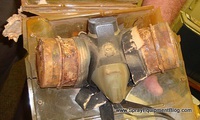Don't Forget the Pest Control PPE
Posted by Andrew Greess on Nov 13, 2018
Great article in PCT Magazine (by Allen Fugler) recently about ensuring that pest control technicians remember to use their pest control PPE, specifically eye protection. The article states that, "More than 800,000 people sustain eye injuries at work each year in the United States". This is scary stuff.
I won't reiterate the entire article here, but I do want to lend my supporting data to the issue.
Our experience is that most pest control & weed control technicians are pretty good about using pest control personal protective equipment while they are applying pesticides or herbicides. The biggest issue we see is all the other times.

Some examples:
1. Spray Tech brings his leaking gun into our shop for repairs. He is NOT wearing PPE.
2. Spray Tech shows us a leak in his spray hose. While unwinding the hose to find the leak, he is NOT wearing PPE.
3. Spray tech needs a replacement part. He does not know the name of the part so he sends us this photo. He is NOT wearing PPE.
Everyone we talk to says they use PPE all the time. Our own eyes tell us that is not the case.
Pest control & weed control technicians - you only have 1 body and 1 life. Don't risk it. Use your PPE anytime you are touching your power spray equipment.
Licensed pest control and weed control applicators are required to carry personal protective equipment (PPE) on their vehicle with them. Some PPE is used every day (gloves), some is not (respirators). We also recommend that spray technicians periodically check their PPE to ensure it is in good working order for when they need.

Personal protective equipment to make sure:
i. It’s there
ii. It’s uncontaminated
iii. It’s in good shape
iv. It’s not expired.
v. It fits.
If you are with a company with multiple technicians, then supervisors should periodically inspect vehicles to ensure PPE is present and in good working order. Another idea is to require technicians to bring their PPE to a staff meeting for inspection.
Some good policies to consider:
1. Develop a company policy on PPE. What's required, proper use, storage, replacement, etc.
2. Technicians should inspect PPE regularly.
3. Supervisors should inspect technician PPE periodically.
4. Occasionally have a technician meeting discussing safety & PPE. Ask your safety equipment provider to do a demonstration of proper use and fit of PPE. They will be happy to do this.
You can read the full PCT Article here (click)
Comments?

